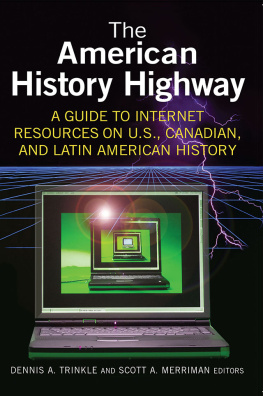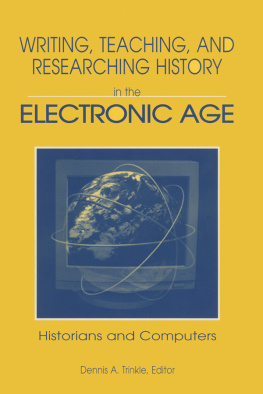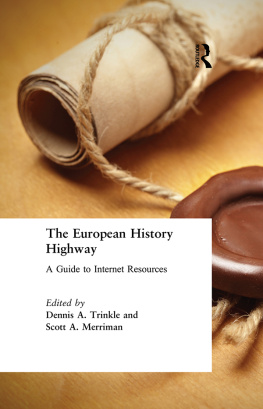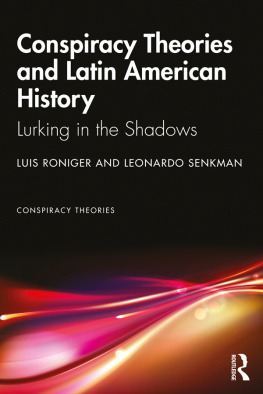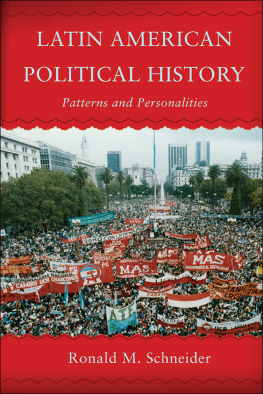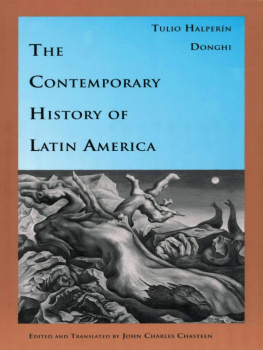The American History Highway
Also Available:
The History Highway: A 21st Century Guide to Internet Resources
The European History Highway: A Guide to Internet Resources
The US History Highway: A Guide to Internet Resources
The World History Highway: A Guide to Internet Resources
The American History Highway
A GUIDE TO INTERNET RESOURCES ON U.S., CANADIAN, AND LATIN AMERICAN HISTORY
DENNIS A. TRINKLE AND SCOTT A. MERRIMAN
EDITORS
First published 2007 by M.E. Sharpe
Published 2015 by Routledge
2 Park Square, Milton Park, Abingdon, Oxon OX14 4RN
711 Third Avenue, New York, NY 10017, USA
Routledge is an imprint of the Taylor & Francis Group, an informa business
Copyright 2007 Taylor & Francis. All rights reserved.
No part of this book may be reprinted or reproduced or utilised in any form or by any electronic, mechanical, or other means, now known or hereafter invented, including photocopying and recording, or in any information storage or retrieval system, without permission in writing from the publishers.
Notices
No responsibility is assumed by the publisher for any injury and/or damage to persons or property as a matter of products liability, negligence or otherwise, or from any use of operation of any methods, products, instructions or ideas contained in the material herein.
Practitioners and researchers must always rely on their own experience and knowledge in evaluating and using any information, methods, compounds, or experiments described herein. In using such information or methods they should be mindful of their own safety and the safety of others, including parties for whom they have a professional responsibility.
Product or corporate names may be trademarks or registered trademarks, and are used only for identification and explanation without intent to infringe.
Library of Congress Cataloging-in-Publication Data
The American history highway: a guide to Internet resources on U.S., Canadian, and Latin American history / edited by Dennis A. Trinkle and Scott A. Merriman.
p. cm.
Includes bibliographical references and index.
ISBN: 978-0-7656-1629-6 (pbk.: alk. paper)
1. AmericaHistoryResearch. 2. HistoryComputer network resourcesDirectories. 3. HistoryResearchMethodology. 4. Internet. I. Trinkle, Dennis A., 1968 II. Merriman, Scott A., 1968
E16.5.A46 2007
973.0285'4678dc22
2006033212
ISBN 13: 9780765616296 (pbk)
In honor of the next generation, Caroline Bradshaw Merriman and John Thomas Trinkle, and the one before, especially Gayle Trinkle
The idea for The History Highway was conceived nearly a decade ago. That the work is now entering its fifth incarnation is a testament to its value to students, instructors, and lovers of history. It is also a tribute to the many individuals who have contributed directly and indirectly to the project over the past ten years. We cannot possibly thank everyone who has played a role in writing, so we hope you know that your efforts and support are recognized and appreciated. We would especially like to thank the contributors to this and past editions of The History Highway. We extend our sincere thanks and hearty apologies to Stephen Kneeshaw, whose chapter, History and Social Studies Organizations, was not correctly attributed to him in the last edition of the work.
Dennis A. Trinkle would like to thank the faculty, staff, and students of DePauw University for their many tangible and intangible contributions to the development of the History Highway series. DePauw is a lively learning community, and I want to thank President Robert Bottoms and Executive Vice President Neal Abraham for their support and encouragement of my many activities. I also want to especially thank several former colleagues at DePauw who made my teaching, research, and work better and more successful: Annette Coon, Aaron Dzuibinsky, Bob Hershberger, Julianne Miranda, Ken Owen, Rick Provine, Nate Romance, and Carol Smith.
I would also like to thank the members of my other professional familythe American Association for History and Computing. In particular, my sincere appreciation is extended to David Staley, Charles Mackay, Jeffrey Barlow, Kelly Robison, Jessica Lacher-Feldman, Steve Hoffman, and Deborah Anderson. It is a genuine pleasure to work with so many creative and passionate teachers and scholars. Finally, but certainly not least, special thanks to my wife, Kristi, my greatest blessing John Thomas, my brother Keith, my mother Gayle, and all the members of my extended family. Your constant energy and care are a great inspiration.
Scott A. Merriman would like to thank his family, friends, and teachers, both past and present, for their support and guidance. Special thanks to my wife, Jessie, for her assistance, both in this writing effort and in many others, and to my daughter Caroline for all the smiles and ducks (red, white, blue and yellow) that she has brought into my life. I would also like to recognize the History Department of the University of Kentucky, faculty, staff, graduate students, and fellow part- and full-time instructors alike, for their support and encouragement. Especially deserving of gratitude for serving as mentors are, among others, Robert Ireland and Robert Olson. My years at UK have been enriched by my friendships with, among many others, Jessica Flinchum, Amber Fogle, Elizabeth Hill, Stephanie May, Erin Shelor, Jeremiah Taylor, and Jennifer Walton.
In my larger travels, I have been ably assisted by many people, far too many to mention, and I would be remiss if I did not thank at least some of them here. I am truly grateful for my continuing friendships and professional relationships with Jeffrey Barlow, Rowly Brucken, Bud Burkhardt, Randal Horobik, Jen McGee, Kelly Robison, David Staley, and Paul Wexler. I am thankful to my family for their perpetual support. Finally, for all those who have supported me, but who are not specifically mentioned, thanks!
More than 60 percent of American households now report that they regularly access the Internet. This figure represents a stunning historical transformation. The number of Web pages is increasing so rapidly that no reliable estimate exists, though best guesses suggest more than 8 billion Web pages. The growth rate and proliferation are staggering and historically unprecedented. Radio, television, and the telephone became part of American daily life at a comparatively glacial pace. Such dizzying expansion and alteration make the Internet a tremendously exciting phenomenon, but also unsettling and unwieldy.
When we wrote the first edition of The History Highway in 1996, we lamented that trying to explore and sample the Internet was like trying to sip water from a fire hose. When The History Highway 2000 appeared, and when The History Highway 3.0 followed, the metaphor might have been changed to sipping water from a rushing river or Niagara Falls. Today, that first fire hose might be replaced by a roaring ocean. The pace of expansion and change is accelerating.
To novices and even seasoned users, the information superhighway can be information overload at its worst, often more intimidating and frustrating than exciting. For anyone interested in history, however, the Internet simply cannot be ignored. The resources are richer and more valuable than ever. There are hundreds of thousands of sites dedicated to the American Revolution alone. Students can find the complete texts of millions of books, work with previously inaccessible primary documents, and explore thousands of first-rate sites dedicated to historical topics. Publishers can advertise their wares, and professors can find enormous databases devoted to teaching suggestions, online versions of historical journals, and active scholarly discussions on a wide variety of research topics. The Internet is quite simply the most revolutionary storehouse of human knowledge in history.


